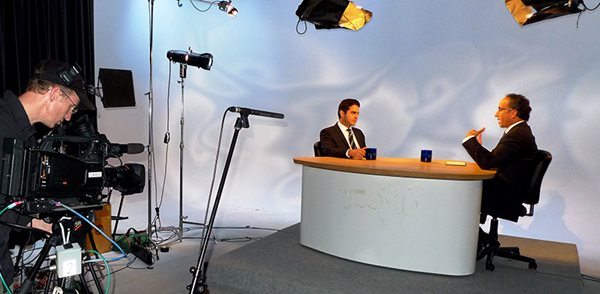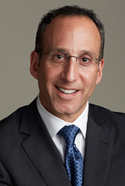
DOCTOR'S ORDERS: Dr. David Granet (right) interviews Dr. Alexander Khalessi, assistant professor of neurosurgery at UC San Diego School of Medicine
Back when Dr. David Granet was an undergraduate at the University of Pennsylvania, he fulfilled his passion for sports by calling radio and TV play-by-play action for Penn’s Ivy League basketball team.
Equally comfortable behind a microphone as when he’s performing delicate eye surgery – his specialty is childhood eye misalignments and disorders – Granet also has always enjoyed teaching about health and medicine.
Since 1995, he has served as the only host of
“Health Matters,” a 30-minute interview show produced by UCSD-TV, a program of UC San Diego Extension. His monthly guest list is dominated by doctors, professors and medical experts with close connections to UC San Diego, along with guests from other institutions.
A range of recent interview topics has included technology addictions, brain tumors, e-cigarettes, and ALS (for links to sample shows, see below).
As a concession to his hectic schedule, he tapes several editions the same day, moving easily from each show’s guest as he elicits lively, instructive conversation on complex issues and topics. Over the years, “Health Matters” ranks among UCSD-TV’s most-viewed casts, with composite numbers now reaching in the multiple millions.
The chief of
UC San Diego’s Division of Pediatric Ophthalmology & Strabismus, as well as an Adult Eye alignment specialist with
UC San Diego’s Shiley Eye Center, Granet has built a wide media reputation for his expertise.

Along with six guest appearances on the nationally syndicated TV series “The Doctors,” he also regularly records video interviews with fellow experts at high-level medical conferences that he attends around the world.
While Granet is not compensated for “Health Matters,” he regards the role as a privilege, a way to give back to his profession.
"I’ve always enjoyed educating; it’s fun for me."
1) How do you walk that line between being a medical expert yourself and an inquiring interviewer?
What I try to do is say something like, “I’m not sure everybody realizes this, but asthma can sometimes be dangerous, right?” Then I let them go into their area of expertise. I don’t pretend that I don’t know the basics of what we’re talking about.
2) How has your approach changed over the years?
First, I had to find my own “voice.” It wasn’t as automatic as I thought it would be. [UCSD-TV managing director] Lynn Burnstan and her staff were great, very supportive. In fact, she had more confidence in me than I did - she wouldn’t even let me use a teleprompter. She told me, “You talk so well, you don’t need those things.”
3) So your questions are not scripted at all?
I’ll write notes to myself on the topics I want to cover, but I never write out my questions beforehand.
4) How do you prepare for each show?
The show’s producer, Rachel Bradley, does a huge amount of the background work. I also do a lot of my own preparation beforehand, so I have a pretty good grasp of what I’m going to ask. After I’ve read everything they give me, I’ll go on “chat sites” to find out what patients want to know.
5) What happens when your guest goes off in a different direction, one you didn’t expect?
Sometimes, it’s fabulous and off they go. And sometimes, the direction they go isn’t all that interesting, so I have to bring it back with another topic.
6) At what point do you start to think about your closing remarks?
About two-thirds of the way into the show. While the guest is talking, I’m trying to think: What’s the best way to wrap this up? What do I want to highlight from our conversation? When that time comes, I’m ready.
7) What skills make a good TV host and a good doctor?
You can be a hellaciously good doctor – know all your stuff – but not be great on TV. You’ve got to be able to communicate with your guests just like you talk with your patients. At some level, every doctor needs those skills. I don’t get nervous being on TV, but some people aren’t as comfortable – it is a different skill set. That’s my job, to make the guest at ease so they can communicate what they are expert in.
8) With your ultra-busy schedule, what motivates you to continue doing the show?
It’s my passion. How do you
not chase your passions? That would be a very empty life. I’ve always enjoyed educating; it’s fun for me. Can you tell that I love doing it? I am lucky to have the opportunity to make a difference.
9) From a professional standpoint, how would you access the impact of the show?
When I’m in the office with a patient, I consider that to be “retail medicine” – strictly one-on-one. The way I do “wholesale medicine” is that I teach courses and I train doctors, medical students, and residents – thus I can influence a lot of people. And when they care for their patients, that gives my teaching an even wider impact. So I feel I affect a lot of people in what I do. Doing the show is another way to make a difference.
10) So doing the show is your way of giving back?
If you’re going into medicine strictly for the money, that’s the wrong reason. If any of the medical students tell me they’re going into medicine for that reason alone, I tell them: This is the wrong job for you. In general, doctors are not poor, not by any means. But you work really hard and the commitment you have to make, it rivals the commitment you have to make to your spouse and your kids. As doctors, we all have a huge responsibility. Because being a doctor isn’t only what you do – it’s who you are."
Recent "Health Matters" topics, guests and introductory comments from Dr. Granet:
- E-Cigarettes, Vaping and MRSA (with Dr. Laura Crotty Alexander): “I’m not sure I even understand what an e-cigarette is. Is an e-cigarette like an iPhone? Whatever it is, it’s catching on because it’s done over $2 billion worth of sales. We need to know whether or not these things are safe. We need to know whether or not it’s something we should be promoting. We need to know whether this has any role in our society going forward.”
- Buzzed Driving (with Dr. David Phillips): “One way or another, we can all be touched by someone who makes a bad decision and gets behind the wheel when it’s inappropriate. When is it wrong to get behind the wheel and take control of a two-ton vehicle when you’ve had too much to drink? What is too much to drink? We need some answers.”
- Reversing Paralysis (with Dr. Justin Brown): “When I say the word ‘re-animation’ with regard to the human body, it’s sounds like science fiction. But today, we’re going to find out, like we do a lot here on ‘Health Matters,’ that science fiction is becoming science fact.”